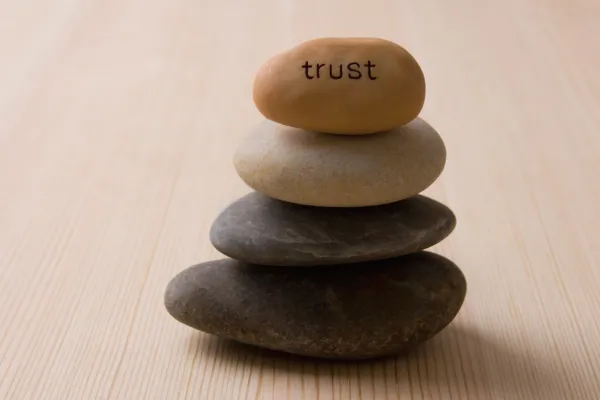BLOG
The Art of Sovereign Living
After Codependency

Five Essential Strategies to Trust Again After Narcissistic Abuse
This journey requires reevaluating what trust means and how it can be rebuilt in a healthy, affirming way. It involves recognizing the scars left by a narcissistic upbringing and understanding how they shape perceptions and interactions.
Trust, that delicate and essential thread woven into the fabric of every meaningful relationship, holds the power to deepen connections and foster true intimacy. Yet, for those whose formative years were overshadowed by the presence of a narcissistic parent, trust can seem like a distant, perhaps even unattainable, concept. In such environments, trust may have been frequently undermined or betrayed, leaving deep-seated wounds that can make trusting difficult and sometimes terrifying.
Growing up with a narcissistic parent often means that the normal dynamics of trust and security are inverted. Children in these settings learn to tread carefully in a landscape where affection is conditional, and manipulation is common. The unpredictability of a narcissistic caregiver's affections forces the child to become hyper-vigilant, always on alert for the next mood shift or emotional withdrawal. This constant state of uncertainty ingrains a profound fear of trust, as reliance on others once equated to vulnerability and potential emotional pain.
For those who have lived through such experiences, trust is not simply about believing that someone will not betray them; it's also about overcoming the deeply ingrained belief that they are inherently unworthy of reliable love and support. The skepticism they learned to protect themselves in their youth becomes a barrier that isolates them from fulfilling relationships in adulthood.
Understanding this altered perspective on trust is crucial. It's not that the desire to connect and build trust is absent; instead, it's entangled in the fear and pain of past betrayals. Healing from this can be a slow and sometimes painful process, as it involves not just learning to trust others, but also, and perhaps more importantly, learning to trust oneself and one's judgments.
This journey requires reevaluating what trust means and how it can be rebuilt in a healthy, affirming way. It involves recognizing the scars left by a narcissistic upbringing and understanding how they shape perceptions and interactions. By addressing these deep-seated issues, individuals can begin to untangle the threads of their past, weaving new patterns of trust that support their emotional needs and foster genuine, lasting relationships.
Like a fragile seedling that needs consistent nurturing to grow into a robust plant, trust must be tended with patience and understanding. Here are five strategies to guide you on this transformative path:
Start Small: Trust doesn't need to be rebuilt all at once. Like cultivating a garden, it can start with tiny seeds. Begin by extending trust in low-risk situations where the consequences of betrayal are manageable. This could be as simple as trusting a friend to recommend a book or a colleague to take notes at a meeting. Small acts of trust can pave the way for more significant gestures, gradually strengthening your trust muscles.
Self-Reflection: Understanding your trust issues begins with introspection. Reflect on your past experiences and how they've shaped your expectations and reactions in relationships. This understanding can illuminate patterns that may be holding you back from forming trusting bonds. Journaling can be a powerful tool in this process, helping you untangle feelings and fears and distinguish between past hurts and present possibilities.
Set Clear Boundaries: Knowing and clearly communicating your boundaries to others can significantly enhance trust. When people understand where you stand, it reduces misunderstandings and builds a safe space where trust can flourish. Remember, asserting your boundaries isn't about building walls; it's about clarifying your needs and expectations in a relationship.
Practice Open Communication: Trust thrives in environments where open and honest communication is the norm. Strive to express your thoughts and feelings transparently and invite others to do the same. This practice helps to foster an atmosphere of mutual respect and understanding, where trust can grow without fear of judgment or retaliation.
Seek to Forgive: Holding onto past betrayals can poison current and future relationships. While forgiveness doesn't mean forgetting or excusing harmful behaviors, it does involve letting go of the hold that past hurts have on you. Forgiveness can be a liberating part of the trust-rebuilding process, freeing you to engage with life and others more openly and trustfully.
Rebuilding trust is a profound journey that transcends mere recovery from past wounds; it is an essential path to a richer, more connected, and genuinely authentic life. This process is not linear nor swift—it requires time, immense patience, and a nurturing, steady approach. Each small step in this journey contributes to a larger transformation that heals and enriches one's emotional landscape.
It is crucial to understand that rebuilding trust is about more than shielding oneself from potential hurt. It's about opening doors to new possibilities and deepening connections that enrich life. It involves developing the courage to trust again, not as a blind leap into uncertainty but as a considered, informed choice that acknowledges the risks and rewards inherent in forming meaningful relationships. This kind of trust-building enhances life's texture, adding depth and vibrancy to every interaction and relationship.
As you embark on this journey, each strategy you implement—from setting clear boundaries to engaging in open and honest communication—is vital to regaining your trust in others and, importantly, in yourself. Every small victory in this process should be recognized and celebrated. Whether successfully expressing your needs in a relationship or simply choosing to share your feelings with a friend, these are significant milestones on the path to recovery.
Furthermore, remember that this journey is not just about overcoming the fear of betrayal but about fostering an open and receptive heart to love and joy. An open heart is a resilient one that understands its strength and the intrinsic value of emotional connections. The openness to trust and the wisdom gained from past experiences form a powerful combination that paves the way for more genuine and fulfilling interactions.
During this transformative process, remaining patient with yourself is vital. Healing and trust-building do not adhere to a set timetable, and there will be moments of doubt and setbacks along the way. These challenges are natural and provide opportunities for further growth and insight. Each step forward, no matter how small, is an act of courage—a reaffirmation of your commitment to living a life defined not by past hurts but by the potential for future happiness and fulfillment.
In summary, rebuilding trust is a rich, evolving journey that prevents future pain and actively creates a life filled with deeper connections, understanding, and authentic joy. By continuing to walk this path with intention and patience, you are gradually crafting a world where trust is not a scarce resource but a flourishing one, enabling you to engage with the world around you in more meaningful and heart-opening ways.
FREE DOWNLOAD
Free E-book:
The Sovereign Woman’s Roadmap: Reclaiming
Your Power & Trusting Yourself Again
Ready to break free from codependency and reclaim your sovereignty?
The Sovereign Woman’s Roadmap is your step-by-step guide to healing from self-abandonment, rebuilding self-trust, and stepping into a life of empowerment and purpose.
This free e-book provides practical tools, trauma-informed strategies, and self-reclamation exercises to help you break old patterns, set strong boundaries, and rise into the empowered, sovereign woman you were meant to be.
Download your free copy today and take your first step toward freedom, self-worth, and emotional sovereignty!
© Copyright 2025 JD Integrative Coaching, LLC - Privacy Policy - Terms & Conditions - Disclaimer

